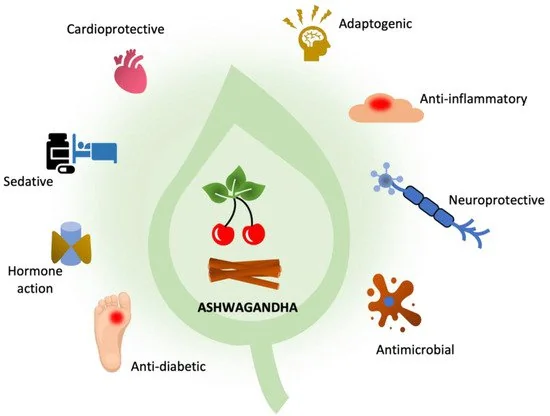Mental clarity and focus are essential for navigating the complexities of modern life. Whether it’s meeting deadlines at work, studying for exams, or simply managing daily tasks, having a clear mind and the ability to concentrate can make a significant difference in our productivity and overall well-being.
Ashwagandha, a powerful adaptogenic herb, can significantly enhance mental clarity and focus. One of the primary ways it does this is by reducing cortisol levels, the body’s main stress hormone. Lower cortisol levels help alleviate stress and anxiety, creating a calmer mental state that is conducive to clear thinking and concentration.
Additionally, Ashwagandha has neuroprotective properties that support brain health. It enhances cognitive function by promoting the growth of nerve cells and protecting the brain from oxidative stress and free radicals. This leads to improved memory, better reaction times, and overall better cognitive abilities.
Nutritional composition and active ingredients
The roots of the Ashwagandha plant contain a variety of bioactive compounds, including alkaloids, steroidal lactones (withanolides), saponins, and glycosides. These compounds are believed to be responsible for the herb’s numerous health benefits.
Explanation of adaptogens and their role in stress management

Adaptogens are a unique group of herbs and mushrooms known for their ability to help the body adapt to various stressors, be they physical, chemical, or biological. These natural substances work by modulating the body’s stress response systems, which include the hypothalamic-pituitary-adrenal (HPA) axis and the sympathetic nervous system.
The HPA axis is a central part of our body’s stress response mechanism. When we encounter stress, the hypothalamus releases corticotropin-releasing hormone (CRH), which signals the pituitary gland to release adrenocorticotropic hormone (ACTH). ACTH then stimulates the adrenal glands to produce cortisol, a key stress hormone. This cascade helps the body manage and respond to stress.
How Ashwagandha functions as an adaptogen

Adaptogens help regulate this process by influencing the release of stress hormones and enhancing the body’s ability to maintain balance, or homeostasis. They help prevent the overactivation of the HPA axis, reducing the harmful effects of chronic stress.
Ashwagandha exerts its adaptogenic effects by regulating the production of stress hormones such as cortisol and adrenaline. By modulating these hormones, Ashwagandha helps the body cope with stress more effectively, leading to improved mental clarity and resilience.
Similarly, adaptogens affect the sympathetic nervous system, which is responsible for the “fight or flight” response. By modulating this system, adaptogens help the body remain calm and composed in the face of stress, preventing the negative impacts of prolonged sympathetic activation.
1. Ashwagandha increases neurotransmitter levels

Neurotransmitters are chemical messengers that transmit signals between nerve cells in the brain. Imbalances in neurotransmitter levels can contribute to mood disorders such as anxiety and depression. Ashwagandha has been shown to modulate the levels of neurotransmitters such as serotonin, dopamine, and gamma-aminobutyric acid (GABA), which play a key role in regulating mood and cognitive function.
2. Reducing Stress and Anxiety

1. Reducing Cortisol Levels
Cortisol is known as the “stress hormone” because it is released in response to stress. Chronic stress can lead to consistently high cortisol levels, which can negatively impact your mood, energy levels, and cognitive functions. By reducing cortisol levels, Ashwagandha helps mitigate these adverse effects, promoting a sense of calm and relaxation.
2. Enhancing Concentration and Cognitive Function
High cortisol levels can interfere with brain function, leading to problems with concentration, memory, and overall cognitive performance. By lowering cortisol, Ashwagandha supports better brain function, making it easier to focus and think clearly. This improved mental clarity can enhance productivity and learning abilities.
Ashwagandha’s ability to lower cortisol levels not only helps reduce stress and anxiety but also improves cognitive functions such as concentration and mental clarity, making it a valuable supplement for those looking to enhance their mental and emotional well-being.
3. Ashwagandha Boosts Energy Levels

1. Impact of Fatigue on Mental Clarity:
Persistent tiredness can significantly impair cognitive functions such as concentration, memory, and decision-making. When you’re constantly fatigued, it becomes difficult to stay focused, process information efficiently, and perform daily tasks effectively.
2. Supporting Adrenal Health
The adrenal glands produce hormones that regulate many vital functions in the body, including the stress response and energy metabolism. Chronic stress can lead to adrenal fatigue, where the glands become overworked and produce insufficient amounts of hormones like cortisol. Ashwagandha supports adrenal health by helping regulate hormone production, preventing adrenal fatigue, and maintaining proper adrenal function.
3. Boosting Energy Production
Ashwagandha is known to enhance the body’s energy production at a cellular level. It does this by increasing the production of adenosine triphosphate (ATP), which is the primary energy carrier in cells. This increase in ATP levels helps improve physical endurance and reduces feelings of fatigue.
4. Providing Sustained Energy
Unlike stimulants that provide a quick burst of energy followed by a crash, Ashwagandha offers sustained energy throughout the day. By supporting adrenal health and enhancing energy production, Ashwagandha helps maintain steady energy levels, reducing the likelihood of experiencing energy slumps and fatigue.
4. Supporting Neurotransmitter Health

1. Balancing Neurotransmitters
Neurotransmitters are chemicals that transmit signals across nerve cells in the brain, influencing various functions, including mood, focus, and overall mental health. Two of the most important neurotransmitters are dopamine and serotonin.
- Dopamine: This neurotransmitter is associated with pleasure, reward, and motivation. Proper dopamine levels help maintain focus, drive, and a positive mood.
- Serotonin: Often referred to as the “feel-good” neurotransmitter, serotonin plays a key role in regulating mood, anxiety, and happiness. Balanced serotonin levels contribute to feelings of well-being and emotional stability.
2. Role of Ashwagandha
Ashwagandha influences the levels and activity of these neurotransmitters in several ways:
- Modulating Dopamine: Ashwagandha has been shown to support dopamine production and release. By maintaining optimal dopamine levels, it helps improve motivation, focus, and overall cognitive function.
- Enhancing Serotonin: Ashwagandha can also positively affect serotonin levels, helping to alleviate symptoms of depression and anxiety. By boosting serotonin, Ashwagandha promotes a balanced mood and emotional well-being.
3. Promoting a Healthy Balance
By supporting the production and regulation of dopamine and serotonin, Ashwagandha ensures that these neurotransmitters remain in balance. This balance is crucial for maintaining mental clarity, focus, and a positive mood.
4. Keeping Your Mind Clear and Spirits High
- Improved Focus: With balanced neurotransmitter levels, cognitive functions such as concentration, attention, and mental clarity are enhanced. This makes it easier to stay focused on tasks and improve overall productivity.
- Elevated Mood: Balanced serotonin levels contribute to a stable and positive mood, reducing the risk of mood swings, anxiety, and depression. This leads to a more consistent and elevated emotional state.
5. Enhancing Sleep Quality

1. Importance of Quality Sleep
Quality sleep is vital for various aspects of health, particularly for cognitive functions such as memory, concentration, and decision-making. During sleep, the brain undergoes processes that help consolidate memories, clear out toxins, and reset neural connections, all of which are crucial for maintaining mental clarity.
2. Promoting Relaxation
Ashwagandha has natural calming properties that help the body and mind relax. It can help reduce hyperactivity in the brain, promoting a sense of calm and tranquility. This relaxation effect makes it easier to fall asleep and stay asleep throughout the night.
3. Reducing Stress
Chronic stress is a significant barrier to quality sleep. High stress levels lead to the release of cortisol, a hormone that can interfere with the body’s natural sleep-wake cycle. Ashwagandha helps reduce cortisol levels, alleviating stress and anxiety. By mitigating these stress responses, Ashwagandha supports a more restful and uninterrupted sleep.
4. Improving Sleep Patterns
Research has shown that Ashwagandha can enhance various aspects of sleep, including sleep onset (the time it takes to fall asleep), sleep duration, and sleep quality. With improved sleep patterns, individuals experience fewer interruptions during the night and wake up feeling more refreshed.
5. Enhancing Focus and Mental Clarity
A good night’s sleep has a direct impact on cognitive functions. When you sleep well, you are more likely to experience:
- Better Concentration: Quality sleep helps improve attention span and focus, making it easier to concentrate on tasks and perform them efficiently.
- Clear Thinking: Adequate sleep enhances cognitive processing and problem-solving skills, allowing for clearer and more effective thinking.
- Memory Consolidation: During sleep, the brain consolidates and organizes memories, leading to better recall and learning.
By promoting relaxation and reducing stress, Ashwagandha improves sleep patterns, which in turn supports better mental clarity and cognitive function. A good night’s sleep, facilitated by Ashwagandha, enhances your ability to focus, think clearly, and perform daily tasks effectively.
6. Prevention of neuronal damage and cognitive decline

1. Oxidative Stress:
- Mechanism: Oxidative stress refers to the imbalance between the production of free radicals and the body’s ability to counteract their harmful effects through antioxidants. Excessive oxidative stress can damage cellular components, including lipids, proteins, and DNA, leading to neuronal damage and contributing to neurodegenerative diseases.
- Ashwagandha’s Role: Ashwagandha has been shown to possess antioxidant properties. It can scavenge free radicals and enhance the activity of endogenous antioxidant enzymes such as superoxide dismutase (SOD) and catalase. By reducing oxidative stress, Ashwagandha helps protect neurons from damage.
2. Excitotoxicity:
- Mechanism: Excitotoxicity occurs when neurons are damaged and killed by excessive stimulation by neurotransmitters such as glutamate. This process is a common pathway leading to neuronal injury in various neurodegenerative diseases, including Alzheimer’s disease and Parkinson’s disease.
- Ashwagandha’s Role: Animal studies have demonstrated that Ashwagandha can modulate neurotransmitter systems and protect neurons from excitotoxic damage. It may reduce the levels of glutamate and prevent the overactivation of its receptors, thereby mitigating excitotoxicity.
3. Protein Misfolding:
- Mechanism: Protein misfolding and aggregation are hallmark features of several neurodegenerative diseases, such as Alzheimer’s disease (characterized by amyloid-beta plaques) and Parkinson’s disease (characterized by alpha-synuclein aggregates). Misfolded proteins can disrupt cellular functions and trigger neuronal death.
- Ashwagandha’s Role: Research indicates that Ashwagandha can enhance the expression of heat shock proteins, which assist in the proper folding and refolding of proteins. This helps in reducing the accumulation of misfolded proteins and their toxic aggregates in neuronal cells.
Implications for Aging and Neurodegenerative Diseases
Given these neuroprotective mechanisms, Ashwagandha holds promise for preventing or slowing down the progression of cognitive decline associated with aging and neurodegenerative diseases. By mitigating oxidative stress, reducing excitotoxicity, and preventing protein misfolding, Ashwagandha may help preserve neuronal integrity and function.
- Aging: As the brain ages, it becomes more susceptible to oxidative stress and excitotoxicity, which can lead to cognitive decline. Ashwagandha’s antioxidant properties and its ability to modulate neurotransmitter systems can contribute to maintaining cognitive function in the aging brain.
- Neurodegenerative Diseases: In conditions like Alzheimer’s and Parkinson’s diseases, where oxidative stress, excitotoxicity, and protein misfolding play crucial roles in disease pathology, Ashwagandha’s multi-faceted neuroprotective effects could offer therapeutic benefits.
Clinical studies demonstrating its efficacy in anxiety management
Numerous clinical studies have investigated the effects of Ashwagandha on anxiety and found promising results. In a double-blind, placebo-controlled trial involving 64 participants with chronic stress, those who took Ashwagandha supplements experienced a significant reduction in anxiety scores compared to the placebo group.
Effects of Ashwagandha on attention span and cognitive performance

One particular study focused on rats administered with Ashwagandha extract. These rats exhibited significant improvements in spatial memory and overall cognitive function when compared to a control group that did not receive the extract. Spatial memory is crucial for navigating environments and remembering locations, indicating that Ashwagandha positively affects brain areas involved in these tasks.
Human studies have mirrored these findings, showing that Ashwagandha supplementation can enhance various cognitive tasks. For example, individuals who took Ashwagandha showed improvements in reaction time, meaning they could respond more quickly to stimuli. This enhancement suggests that Ashwagandha may help speed up information processing in the brain.
Moreover, studies have also observed better decision-making abilities in individuals using Ashwagandha. This implies that the herb may support higher-order cognitive functions, allowing people to evaluate situations more effectively and make sound choices.
Additionally, Ashwagandha has been associated with improved task-switching, which is the ability to shift attention from one task to another smoothly. Enhanced task-switching indicates better cognitive flexibility and the capacity to manage multiple activities efficiently.
Frequently Asked Questions
1. Can Ashwagandha be taken with other supplements or medications? Yes, but it’s advisable to consult with a healthcare professional to avoid potential interactions.
2. How long does it take to experience the effects of Ashwagandha on mental clarity? Individual responses may vary, but some people notice improvements within a few weeks of consistent use.
3. Are there any side effects associated with Ashwagandha supplementation? While generally considered safe, some individuals may experience mild side effects such as digestive issues or drowsiness.
4. Can Ashwagandha be taken long-term? Yes, Ashwagandha is safe for long-term use, but it’s recommended to take breaks periodically to assess its ongoing benefits.
5. Is Ashwagandha suitable for children? Ashwagandha supplements are typically formulated for adults and may not be suitable for children. Consultation with a pediatrician is recommended before giving Ashwagandha to children.
References
- Chandrasekhar, K., Kapoor, J., & Anishetty, S. (2012). A prospective, randomized double-blind, placebo-controlled study of safety and efficacy of a high-concentration full-spectrum extract of ashwagandha root in reducing stress and anxiety in adults. Indian Journal of Psychological Medicine, 34(3), 255–262. DOI: 10.4103/0253-7176.106022
- Kato, K., & Longhurst, J. C. (2003). Stress-induced gastric ulceration: Progress in understanding mechanisms and future perspectives. World Journal of Gastroenterology, 9(11), 2270–2278. DOI: 10.3748/wjg.v9.i11.2270
- Mishra, L. C., Singh, B. B., & Dagenais, S. (2000). Scientific basis for the therapeutic use of Withania somnifera (ashwagandha): A review. Alternative Medicine Review, 5(4), 334–346. PMID: 10956379
- Pingali, U., Pilli, R., Fatima, N., & Naidu, V. G. M. (2014). Effect of standardized aqueous extract of Withania somnifera on tests of cognitive and psychomotor performance in healthy human participants. Pharmacognosy Research, 6(1), 12–18. DOI: 10.4103/0974-8490.122912
- Raut, A. A., Rege, N. N., Tadvi, F. M., Solanki, P. V., Kene, K. R., Shirolkar, S. G., … & Vaidya, A. B. (2012). Exploratory study to evaluate tolerability, safety, and activity of Ashwagandha (Withania somnifera) in healthy volunteers. Journal of Ayurveda and Integrative Medicine, 3(3), 111–114. DOI: 10.4103/0975-9476.100168

